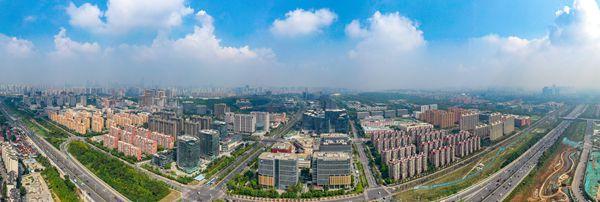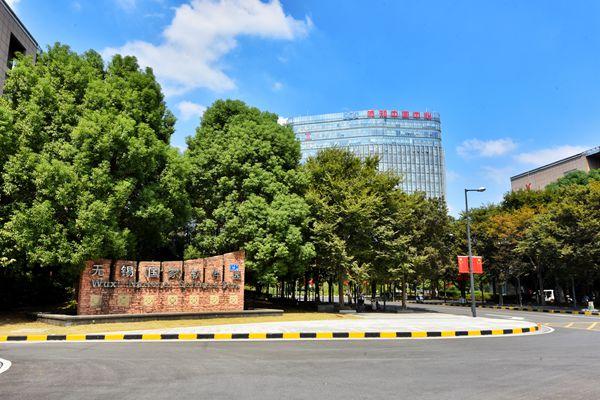Zhou mengjiao
At the beginning of the new year, the Ministry of Industry and Information Technology issued a notice on the evaluation results of China’s famous software cities in 2023. Among the 14 famous software cities in China, Jiangsu is "the only one in China", namely Nanjing, Suzhou and Wuxi.
In fact, as a big manufacturing province, Jiangsu is also a big software province, and the software industry, especially industrial software, is the key support for building a strong manufacturing province. The data shows that in 2023, Jiangsu Province completed software business income of 1.4 trillion yuan, a year-on-year increase of 9.5%; Among them, the industrial software industry chain realized business income of 325.98 billion yuan, a year-on-year increase of 15.2%.
The implementation of 19 measures to accelerate the independent innovation of industrial software, the issuance of "Measures for the Administration of Famous Software Parks in Jiangsu Province", and the promotion of software industry policies around the province … started in the beginning of the year, and the construction of Jiangsu’s software industry accelerated. The work report of Jiangsu provincial government also proposed to promote the high-quality development of industrial software when deploying key work in 2024.

China (Nanjing) Software Valley is an important gathering place of software industry. Photo courtesy of Propaganda Department of Yuhuatai District Committee of Nanjing City
Nanjing gets there first.
"Software Avenue" is the first road named after an industry in Nanjing, with a total length of 5.3 kilometers. Every morning rush hour, code farmers come from all sides and flock to software enterprises along the line.
Nanjing is the first city in Jiangsu to develop its software industry. In 2001, when the software business income was only 1.8 billion yuan, Nanjing proposed to break through 10 billion yuan during the Tenth Five-Year Plan period and achieved it as scheduled. Four years later, the city officially announced the construction of "China’s famous software city" and held the first Nanjing "Soft Expo", positioning the software industry as "the first priority to encourage the development of industries".
By 2010, the scale of Nanjing’s software industry exceeded 100 billion yuan for the first time, making it the first "famous software city in China". Since then, China (Nanjing) Software Valley, Nanjing Software Park and Jiangsu Software Park, which have been carefully laid out locally, have taken shape.
Under the siphon of industrial environment, head software enterprises have successively landed. ZTE and Huawei took the lead in choosing a site to settle down. Over the years, a number of head enterprises, such as Alibaba Jiangsu Headquarters and ByteDance Nanjing R&D Center, have also settled in Nanjing to feed back small and medium-sized enterprises, forming a cluster development pattern of "taking the big and taking the small".
At present, there are about 850,000 software-related employees in Nanjing, with about 4,000 key software-related enterprises, and 53 universities in the city offer software-related majors. In 2022, Nanjing’s software and information service industries were among the first national advanced manufacturing clusters. In 2023, the city’s software business revenue reached 800 billion yuan, ranking first in Jiangsu Province.
Behind the "soft" strength is the "soft environment". The Zijin Index of High-quality Development of Software Industry in China (2023) shows that Nanjing ranks first in terms of policy environment and the establishment of special funds. In the past two years, the Action Plan of Nanjing to Promote the Upgrading of Famous Software Cities and Build Trillion-level Industries and the Action Plan of Nanjing to Promote Strong Industrial Cities (2023-2025) have been issued successively, which further helps to build a good ecology of the software industry.
Under the exemplary role of Nanjing, since the 13th Five-Year Plan, the scale of Jiangsu’s software industry has been in the forefront of the country. In 2020, the scale of Jiangsu software industry exceeded one trillion for the first time. Before and after this, Suzhou and Wuxi were successively honored as "Famous Cities with Software Characteristics in China".

Wuxi national software park. Photo courtesy of Propaganda Department of Xinwu District Committee of Wuxi City
Overall layout of Jiangsu province
Since 2012, Suzhou has applied for the title of "China’s Famous Software City", and the average annual growth rate of software business income is close to 20%. In the field evaluation of the establishment of China’s famous software city organized by the Ministry of Industry and Information Technology in 2018, the evaluation expert group agreed that Suzhou’s software industry continued to develop rapidly and gave an evaluation score of 106.7 points. The following year, Suzhou was awarded "China Famous City with Software Characteristics" in the direction of industrial software.
It is close to Wangshan in the north and only two kilometers away from Taihu Lake in the east, and the area where Taihu Software Park is located is surrounded by mountains and waters. There are both good scenery and good industries here, and a batch of software enterprises have settled down one after another, and the industrial agglomeration effect has been highlighted.
Through scientific layout and dislocation development, Suzhou has formed an industrial software core cluster represented by Jinjihu Software Industrial Park, Taihu Software Industrial Park and Suzhou High-tech Software Park. In addition, Suzhou has also built two famous software parks in Jiangsu, three provincial-level innovation pilot zones, six provincial-level Internet creative parks and 16 provincial-level "Digital Future" integration and innovation centers, promoting the construction of the first batch of 22 municipal-level digital economy characteristic industrial parks.
Followed by Wuxi, the "Internet of Things Capital of China", in 2021, Wuxi was awarded as "China Famous City with Software Characteristics" in the direction of Internet of Things and platform software.
Wuxi’s selection is also well deserved. People’s Daily noticed that the local government has carried out innovative practices in emerging business fields such as Internet of Vehicles and blockchain, and laid out future industries such as artificial intelligence, metauniverse and quantum computing in advance. In 2023, the business income of Wuxi software industry exceeded 200 billion yuan.
The layout of the whole line is blooming everywhere. As early as 2007, Jiangsu was the first to bless the development of the software industry with the local regulations "Jiangsu Province Software Industry Promotion Regulations". At present, Jiangsu has formed a software industry cluster around Nanjing, Wuxi and Suzhou. The embedded software in Changzhou, Zhenjiang and Nantong, and the information technology service industry in Suqian and Yangzhou have maintained rapid growth … Jiangsu’s software industry is moving in the direction of "Jiangsu, Anhui" and "Jiangsu, Shanghai and Zhejiang", forming a "software innovation corridor along the Yangtze River".
How to achieve a trillion-dollar breakthrough in the software industry with one city? Nanjing is stepping up its efforts to solve problems.
"Focus on improving innovation ability and promote Industry-University-Research’s collaborative research and transformation of technological achievements; Work hard to expand the scale of the industry and accelerate the gathering of a number of global top 500 software companies, top 100 domestic software companies, and listed software companies at home and abroad. " At last year’s China Industrial Software Supply and Demand Conference and China (Nanjing) International Software Products and Information Services Fair, Nanjing Mayor Chen Zhichang put forward the above development goals.
According to the industrial development plan of Nanjing, by 2025, the scale of software and information services in the city will exceed 1 trillion yuan, and the number of software-related employees will exceed 1.1 million. The industrial scale and comprehensive competitiveness will rank among the top in the country.
Industrial software force
In the software industry, industrial software accounts for a small proportion, but it is the brain and nerve of industrial manufacturing. For Jiangsu, which is building a strong province, it is necessary to have both "soft" and "hard".
As a developer of operating systems in the industrial field, the relevant person in charge of Nanjing Yihui said: "The industrial scale of domestic industrial operating systems is currently less than 100 billion, but if it is derived from industrial equipment and intelligent manufacturing scenarios as a base, it is expected to expand to a trillion-dollar market scale in the future."
"In the automobile manufacturing industry, there are some differences between the production plan and the reality, whether it is a large-scale automobile factory or a multi-variety and small-batch small and medium-sized enterprise." Wang Feng, executive vice president of Wuxi Xuelang Industrial Software Research Institute, said, "Based on this, we have developed factory simulation and real-time optimization software, which can preview and verify the production plan in advance, so that the factory can reduce costs and increase efficiency."
In addition to "smart production", industrial software is constantly expanding application scenarios and empowering "smart life". Supported by software algorithms, intelligent traffic scenes such as "smart cars" and "smart roads" in Suzhou can be touched.
Aim at high-end industrial software and seize the new track of the industry. Over the years, a large number of industrial software companies in Nanjing have sharpened their knives with rich industrial scenes, guided by the effective market demand of new manufacturing industries, and made full use of new technologies such as cloud, AI, big data and advanced networks to change the track of scientific and technological competition. At present, Nanjing industrial software products are widely used in key industries such as equipment manufacturing, electronic information, electric power and energy, steel, aviation, aerospace and shipbuilding.
Previously, Jiangsu has listed industrial software as the development focus during the "14 th Five-Year Plan" period in the province’s software industry planning. The advanced layout also made Jiangsu reap fruitful results: in 2023, Jiangsu completed industrial software business income of 325.98 billion yuan, a year-on-year increase of 15.2%, which was 5.7 percentage points higher than the growth rate of the whole software industry.
At the end of December last year, the General Office of Jiangsu Provincial Government issued "Several Policies and Measures on Accelerating Independent Innovation of Industrial Software", which included 19 specific measures from six aspects to further accelerate the high-quality development of basic software and industrial software industry, with emphasis on "supporting the first trial and first use of innovative products".
"Jiangsu still has a strong stamina in the software industry. The research and development of a new generation of artificial intelligence is closely related to Internet big data, and it is necessary to plan from Industry-University-Research in all aspects." Tang Jinhui, dean of the School of Computer (Artificial Intelligence) of Nanjing University of Science and Technology, believes that Jiangsu can do better by striving to create a benign development ecology of "R&D-Application-Iteration".
There are many "quantity", but also "quality". Jiangsu is clear that by 2025, the scale of the province’s software industry will strive to reach 1.6 trillion yuan, cultivate 10 billion-level geese-type software enterprises, and build a national-level software industry cluster.
Reporting/feedback
关于作者